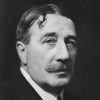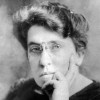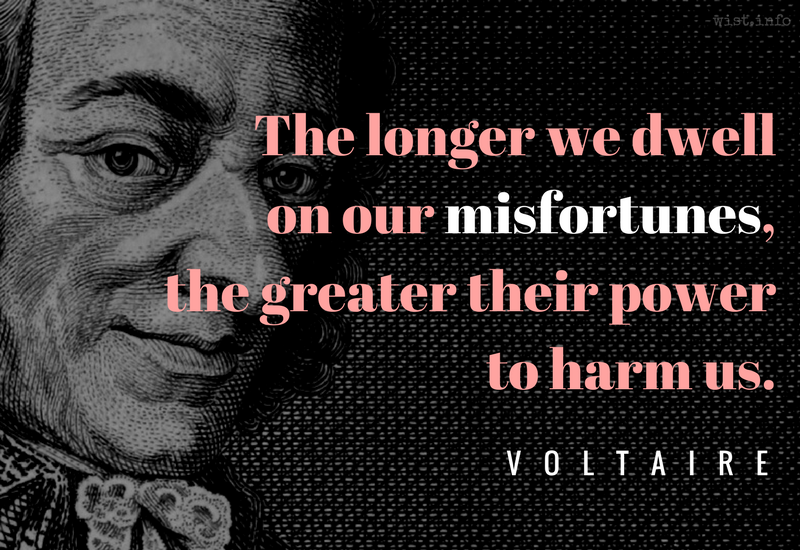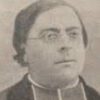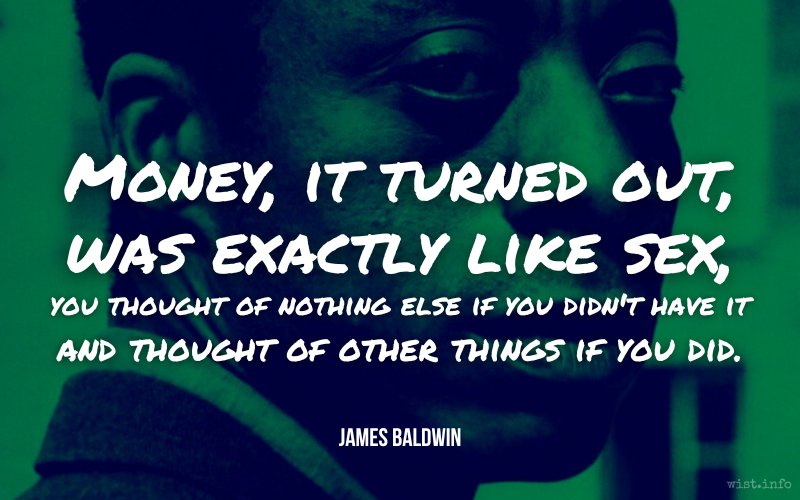Look at one of your industrious fellows for a moment, I beseech you. He sows hurry and reaps indigestion; he puts a vast deal of activity out to interest, and receives a large measure of nervous derangement in return. Either he absents himself entirely from all fellowship, and lives a recluse in a garret, with carpet slippers and a leaden inkpot; or he comes among people swiftly and bitterly, in a contraction of his whole nervous system, to discharge some temper before he returns to work. I do not care how much or how well he works, this fellow is an evil feature in other people’s lives. They would be happier if he were dead. They could easier do without his services in the Circumlocution Office, than they can tolerate his fractious spirits. He poisons life at the well-head. It is better to be beggared out of hand by a scapegrace nephew, than daily hag-ridden by a peevish uncle.
Quotations about:
obsession
Note not all quotations have been tagged, so Search may find additional quotes on this topic.
The man who haz sworn not to forgiv haz uttered the wust oath he kan take.
[The man who has sworn not to forgive has uttered the worst oath he can take.]
Josh Billings (1818-1885) American humorist, aphorist [pseud. of Henry Wheeler Shaw]
Josh Billings’ Farmer’s Allminax, 1875-04 (1875 ed.)
(Source)
Everybody can write; writers can’t do anything else.
Mignon McLaughlin (1913-1983) American journalist and author
The Neurotic’s Notebook, ch. 7 (1963)
(Source)
The working life of the businessman has the psychology of a hundred-yards race, but as the race upon which he is engaged is one whose only goal is the grave, the concentration, which is appropriate enough for a hundred yards, becomes in the end somewhat excessive.
Bertrand Russell (1872-1970) English mathematician and philosopher
Conquest of Happiness, Part 1, ch. 3 “Competition” (1930)
(Source)
Then I attempt to ease my own malaise,
and thus death-pale, fatigued and torn apart,
I go to glimpse you, hopeful I’ll be whole.
And if I lift my eyes so I can gaze,
a seismic shaking starts within my heart
that chases from my pulse my very soul.[Poscia mi sforzo, ché mi voglio atare;
e così smorto, d’onne valor voto,
vegno a vedervi, credendo guerire:
e se io levo li occhi per guardare,
nel cor mi si comincia uno tremoto,
che fa de’ polsi l’anima partire.]Dante Alighieri (1265-1321) Italian poet
La Vita Nuova [Vita Nova; New Life], ch. 16 / Sonnet 7, ll. 9-14 (c. 1294, pub. 1576) [tr. Frisardi (2012), ch. 9]
(Source)
Dante gets his courage up to approach his beloved Beatrice, only to be gobsmacked by her gaze.
(Source (Italian)). Alternate translations:At length I make an effort for relief,
And so, all pale and destitute of power,
I come to gaze on you, in hope of cure:
And if I raise the eyes that I may look,
A trembling at my heart begins, so dread,
It makes the soul take flight from every vein.
[tr. Lyell (1845)]And then if I, whom other aid forsook,
Would aid myself, and innocent of art
Would fain have sight of thee as a last hope,
No sooner do I lift mine eyes to look
Than the blood seems as shaken from my heart,
And all my pulses beat at once and stop.
[tr. Rossetti (c. 1847; 1899 ed.)]Then I resolve, -- this shall no longer be,
And come to seek thee, all amort and pale,
Thinking by sight of thee to cure my pain;
But when I lift mine eyes to look on thee,
My heart within my bosom begins to quail,
And my perturbed soul takes flight from every vein.
[tr. Martin (1862)]Then to mine aid I summon up my strength,
And so, all pale, and empty of defence,
I seek thy sight, thinking to be made whole;
And if to look I lift mine eyes at length,
Within my heart an earthquake doth commence,
Which from my pulses driveth out the soul.
[tr. Norton (1867), ch. 16]To aid me then my forces I renew
And pallid, all my courage drained long since,
I come to you to remedy my plight;
But if I raise my eyes to look at you
So vast a tremor in my heart begins
My beating pulses put my soul to flight.
[tr. Reynolds (1969)]Hoping to help myself, I gather courage
And pale, drawn, lacking all defense
I come to you expecting to be healed;
But if I raise my eyes to look at you
An earthquake starts at once within my heart
And drives life out and stops my pulses' beat.
[tr. Musa (1971)]With hope of help to come I gather courage,
and deathly languid, drained of all defenses,
I come to you expecting to be healed;
and if I raise my eyes to look at you,
within my heart a tremor starts to spread,
driving out life, stopping my pulses’ beat.
[tr. Hollander (1997), sec. 9-10]I renew my strength, because I wish for help,
and pale like this, all my courage drained,
come to you, believing it will save me:
and if I lift my eyes to gaze at you
my heart begins to tremble so,
that from my pulse the soul departs.
[tr. Kline (2002)]Then I make an effort, because I want to defend myself:
and thus, wan and drained of all strength,
I come to see you, thinking I will recover:
but if I raise my eyes to look at you,
such a great trembling begins in my heart
that it makes my soul desert my heartbeats.
[tr. Appelbaum (2006)]
Books have another value, to those who have fallen forever and wholly in love with them. There are those who would cheat for them, steal for them, lie for them, even if then they could never show or boast of their treasures to any other creature. Kill for them? It was not impossible.
Ellis Peters (1913-1995) English writer, translator [pseud. of Edith Mary Pargeter, who also wrote under the names John Redfern, Jolyon Carr, Peter Benedict]
The Heretic’s Apprentice, ch. 12 (1990)
(Source)
JANE: Friendship’s more lasting than love. And more legal than stalking.
Steven Moffat (b. 1961) Scottish television writer, producer
Coupling, 01×02 “Size Matters” (2000-05-19)
(Source)
He that feares death lives not.
George Herbert (1593-1633) Welsh priest, orator, poet.
Jacula Prudentum, or Outlandish Proverbs, Sentences, &c. (compiler), # 781 (1640 ed.)
(Source)
What a mystery this is, desire. The love sickness, the sensitivity, the obsession, the flutter of the heart, the ebb and flow of the blood. There is no drug and no alcohol to equal it.
Only about 1 percent of my writings are concerned with sex, but the conventional public is so obsessed with sex that it hasn’t noticed the other 99 percent of my writings.
Bertrand Russell (1872-1970) English mathematician and philosopher
Interview by Woodrow Wyatt, BBC TV (1959)
(Source)
Collected in Bertrand Russell's BBC Interviews (1959) [UK] and Bertrand Russell Speaks His Mind (1960) [US]. Reprinted (abridged) in The Humanist (1982-11/12), and in Russell Society News, #37 (1983-02).
She was his life,
The ocean to the river of his thoughts,
Which terminated all.
Writing is more than anything a compulsion, like some people wash their hands thirty times a day for fear of awful consequences if they do not. It pays a whole lot better than this type of compulsion, but it is no more heroic.
Julie Burchill (b. 1959) English novelist, columnist, broadcaster
Sex & Sensibility, Introduction (1992)
(Source)
Not sweet son, nor revered old father, nor
The long-due love which was to have made glad
Penelope for all the pain she bore,
Could conquer the inward hunger that I had
To master earth’s experience, and to attain
Knowledge of man’s mind, both the good and bad.[Né dolcezza di figlio, né la pieta
del vecchio padre, né ‘l debito amore
lo qual dovea Penelopé far lieta,
vincer potero dentro a me l’ardore
ch’i’ ebbi a divenir del mondo esperto,
e de li vizi umani e del valore.]Dante Alighieri (1265-1321) Italian poet
The Divine Comedy [Divina Commedia], Book 1 “Inferno,” Canto 26, l. 94ff (26.94-99) [Ulysses] (1309) [tr. Binyon (1943)]
(Source)
Ulysses, explaining why he chose to continue exploring over filial piety, leading to his eventual death.
(Source (Italian)). Alternate translations:Not the sweet fondness for a Son, nor yet
The pious duty for an ancient Sire,
Nor all the love I ow'd Penelope,
That ardor could subdue which me possest,
In distant climes experience to learn,
And human Vices as well as Virtues know.
[tr. Rogers (1782), l. 90ff]Yet, after all my toils, nor aged sire,
Nor son, nor spouse, could check the wild desire
Again to tempt the feat, with vent'rous oar.
In search of same I measur'd various climes,
Still vers'd in deeper frauds and nameless crimes,
With slender band, and solitary sail.
[tr. Boyd (1802), st. 16-17]Nor fondness for my son, nor reverence
Of my old father, nor return of love,
That should have crown’d Penelope with joy,
Could overcome in me the zeal I had
T’ explore the world, and search the ways of life,
Man’s evil and his virtue.
[tr. Cary (1814)]That name; nor sweet remembrance of my boy,
Nor old Laertes' grief, nor debt of love,
Which owed Penelope the arrear of joy,
Could quench my burning zeal, that inly strove,
And bade the wisdom of the world explore.
And human vices, human worth to prove.
[tr. Dayman (1843)]Neither fondness for my son, nor reverence for my aged father, nor the due love that should have cheered Penelope,
could conquer in me the ardour that I had to gain experience of the world, and of human vice and worth.
[tr. Carlyle (1849)]Nor sweetness of my son, nor piety
For aged father, nor arrear of love
To glad Penelope, my mind could move,
Could conquer yet the ardour in my breast
In the worldly wisdom to become expert --
In every virtue, and in every art.
[tr. Bannerman (1850)]My son's sweet ways, the sacred duty claim'd
By my old father, nor that debt of love
Due to Penelope, her source of joy,
Could conquer in my soul the burning thirst
To see and know the deep things of the world,
To study human worth and human vice.
[tr. Johnston (1867)]Nor fondness for my son, nor reverence
For my old father, nor the due affection
Which joyous should have made Penelope,
Could overcome within me the desire
I had to be experienced of the world,
And of the vice and virtue of mankind.
[tr. Longfellow (1867)]Neither the sweetness of my son, nor my affection for my old father, nor the due love which ought to have made Penelope happy, could conquer within me the ardour which I had to become experienced in the world, and in the vices of men and in their goodness.
[tr. Butler (1885)]Not my son's sweetness, nor compassionate fear
For my old father, nor the lawful love
That should have cheered Penelope so dear.
Could from my mind the ardent wish remove
Of the wide world experience to attain,
And human vices and man's worth to prove.
[tr. Minchin (1885)]Neither fondness for my son, nor piety for my old father, nor the due love that should have made Penelope glad, could overcome within me the ardor that I had to gain experience of the world, and of the vices of men, and of their valor.
[tr. Norton (1892)]Neither affection for my boy, nor reverence for an aged sire, nor even the debt of love that should have filled Penelope with gladness, had power to quell within me the yearning I had nourished to win experience of the world, men's vices and their worth.
[tr. Sullivan (1893)]Nor sweetness of my son, nor filial duty
To my old father, nor the love I owed her
That should have made Penelope still happy.
Could overcome within my breast the ardour
I had to win experience world-embracing,
As well of human vices as of virtue
[tr. Griffith (1908)]Not fondness for a son, nor duty to an aged father, nor the love I owed Penelope which should have gladdened her, could conquer within me the passion I had to gain experience of the world and of the vices and the worth of men.
[tr. Sinclair (1939)]No tenderness for my son, nor piety
To my old father, nor the wedded love
That should have comforted Penelope
Could conquer in me the restless itch to rove
And rummage through the world exploring it,
All human worth and wickedness to prove.
[tr. Sayers (1949)]Not fondness for my son, nor reverence
for my aged father, nor Penelope's claim
To the joys of love, could drive out of my mind
the lust to experience the far-flung world
and the failings and felicities of mankind.
[tr. Ciardi (1954), l. 89ff]Neither fondness for my son, nor reverence for my aged father, nor the due love which would have made Penelope glad, could conquer in me the longing that I had to gain experience of the world, and of human vice and worth.
[tr. Singleton (1970)]Not sweetness of a son, not reverence
for an aging father, not the debt of love
I owed Penelope to make her happy,
could quench deep in myself the burning wish
to know the world and have experience
of all man's vices, of all human worth.
[tr. Musa (1971)]Neither my fondness for my son nor pity
for my old father nor the love I owed
Penelope, which would have gladdened her,
was able to defeat in me the longing
I had to gain experience of the world
and of the vices and the worth of men.
[tr. Mandelbaum (1980)]Neither affection for my son, nor duty
To my old father, nor the proper love
Which should have given Penelope happiness,
Could overcome, within me, the desire
I had to have experience of the world,
And of the vices and virtues of mankind.
[tr. Sisson (1981)]Not fondness for my son, nor any claim
Of reverence for my father, nor love I owed
Penelope, to please her, could overcome
My longing for experience of the world,
Of human vices and virtue.
[tr. Pinsky (1994), l. 91ff]Neither the sweetness of a son, nor compassion for my old father, nor the love owed to Penelope, which should have made her glad,
could conquer within me the ardor that I had to gain experience of the world and of human vices and worth.
[tr. Durling (1996)]Not even my fondness for my son, Telemachus, my reverence for my aged father, Laërtes, nor the debt of love that should have made Penelope happy, could restrain in me the desire I had, to gain experience of the world, and of human vice and worth.
[tr. Kline (2002)]No tenderness for son, no duty owed
to ageing fatherhood, no love that should
have brought my wife Penelope delight,
could overcome in me my long desire,
burning to understand how this world works,
and know of human vices, worth and valour.
[tr. Kirkpatrick (2006)]Not tenderness for a son, nor filial duty
toward my agèd father, nor the love I owed
Penelope that would have made her glad,
could overcome the fervor that was mine
to gain experience of the world
and learn about man's vices, and his worth.
[tr. Hollander/Hollander (2007)]For my young son's sweetness, or any concern
About my aged father, or the debt of love
I owed Penelope, which would have pleased her,
For nothing could conquer in me the craving to know
This world wee live in, learning its nature, and how
To deal with either human vice or worth.
[tr. Raffel (2010)]No love for my son,
No duty to my father, and what's more
No love I owed Penelope -- the one
Who would have been most glad -- could overcome
In me the passion that I had, to gain
Experience of the world, and know the sum
Of virtue, pleasure, wisdom, vice, and pain.
[tr. James (2013), l. 105ff]
Love is the silent saying and saying of a single name.
Mignon McLaughlin (1913-1983) American journalist and author
The Neurotic’s Notebook, ch. 1 (1963)
(Source)
Do the gods light this fire in our hearts
or does each man’s mad desire become his god?[Dine hunc ardorem mentibus addunt,
Euryale, an sua cuique deus fit dira cupido?]Virgil (70-19 BC) Roman poet [b. Publius Vergilius Maro; also Vergil]
The Aeneid [Ænē̆is], Book 9, l. 184ff (9.184-185) [Nisus] (29-19 BC) [tr. Fagles (2006)]
(Source)
(Source (Latin)). Alternate translations:Doth God our mind inspire, Or makes each man a god of's own desire? [tr. Ogilby (1649)]Or do the gods inspire
This warmth, or make we gods of our desire?
[tr. Dryden (1697)]Do the gods, Euryalus, infuse this ardour into our minds? or is each one's earnest inclination his god?
[tr. Davidson/Buckley (1854)]"Can it be Heaven" said Nisus then
"That lends such warmth to hearts of men,
Or passion surging past control
That plays the god to each one's soul?"
[tr. Conington (1866)]Is it the gods who give
This ardor to our minds, Euryalus?
And must our strong desires be deemed divine?
[tr. Cranch (1872), l. 230ff]Lend the gods this fervour to the soul, Euryalus? or does fatal passion become a proper god to each?
[tr. Mackail (1885)]Doth very God so set the heart on fire,
Euryalus, or doth each man make God of his desire?
[tr. Morris (1900)]Is it that the Gods inspire,
Euryalus, this fever of the breast?
[tr. Taylor (1907), st. 24, l. 208ff]Is it gods above that breathe
this fever in my soul, Euryalus?
or is the tyrant passion of each breast
the god it serves?
[tr. Williams (1910)]Do the gods, Euryalus, put this fire in our hearts, or does his own wild longing become to each man a god?
[tr. Fairclough (1918)]Euryalus, what is it?
Do the gods put this ardor in our hearts
Or does each man’s desire become his god?
[tr. Humphries (1951)]Is it God that makes one burn to do brave things,
Or does each of us make a god of his own fierce passion to do them?
[tr. Day-Lewis (1952)]Euryalus, is it
the gods who put this fire in our minds,
or is it that each man's relentless longing
becomes a god to him?
[tr. Mandelbaum (1971), l. 243ff]This urge to action, do the gods instill it,
Or is each man's desire a god to him,
Euryalus?
[tr. Fitzgerald (1981), l. 252ff]Is it the gods who put this ardour into our minds, or does every man's irresistible desire become his god?
[tr. West (1990)]Euryalus, do the gods set this fire in our hearts,
or does each man’s fatal desire become godlike to him?
[tr. Kline (2002)]Do the gods
Put this fire in our hearts, Euryalus,
Or do our passions become our gods?
[tr. Lombardo (2005)]Do gods enflame our hearts, Euryalus,
or do our fierce desires become our gods?
[tr. Bartsch (2021)]
Love, you tyrant!
To what extremes won’t you compel our hearts?[Improbe Amor, quid non mortalia pectora cogis!]
Virgil (70-19 BC) Roman poet [b. Publius Vergilius Maro; also Vergil]
The Aeneid [Ænē̆is], Book 4, l. 412 (4.412) (29-19 BC) [tr. Fagles (2006), ll. 518-19]
(Source)
(Source (Latin)). Alternate translations:Impious love,
What canst not thou compell in mortall brests?
[tr. Ogilby (1649)]All-pow'rful Love! what changes canst thou cause
In human hearts, subjected to thy laws!
[tr. Dryden (1697)]Unrelenting love, how irresistible is they sway over the minds of mortals!
[tr. Davidson/Buckley (1854)]Curst love! what lengths of tyrant scorn
Wreak'st not on those of woman born?
[tr. Conington (1866)]Accursèd power of love, what mortal hearts
Dost thou not force to obey thee!
[tr. Cranch (1872), ll. 544-45]Injurious Love, to what dost thou not compel mortal hearts!
[tr. Mackail (1885)]O evil Love, where wilt thou not drive on a mortal breast?
[tr. Morris (1900)]O tyrant love, so potent to subdue!
[tr. Taylor (1907), st. 53, l. 473]Relentless Love,
to what mad courses may not mortal hearts
by thee be driven?
[tr. Williams (1910), l. 409ff]O tyrant Love, to what dost thou not drive the hearts of men!
[tr. Fairclough (1916)]There is nothing to which the hearts of men and women
Cannot be driven by love.
[tr. Humphries (1951)]Excess of love, to what lengths you drive our human hearts!
[tr. Day Lewis (1952)]Voracious Love, to what do you not drive
the hearts of men?
[tr. Mandelbaum (1971), ll. 566-67]Unconscionable Love,
To what extremes will you not drive our hearts!
[tr. Fitzgerald (1981), ll. 571-72]Love is a cruel master. There are no lengths to which it does not force the human heart.
[tr. West (1990)]Cruel Love, to what do you not drive the human heart? [tr. Kline (2002)]Cruel Love, what do you not force human hearts to bear?
[tr. Lombardo (2005)]Cursed love, you make us stoop to anything.
[tr. Bartsch (2021)]
But, oh, how little they know, the omniscient seers.
What good are prayers and shrines to a person mad with love?
The flame keeps gnawing into her tender marrow hour by hour
and deep in her heart the silent wound lives on.
Dido burns with love — the tragic queen.[Heu vatum ignarae mentes! quid vota furentem,
quid delubra iuvant? Est mollis flamma medullas
interea, et tacitum vivit sub pectore volnus.
Uritur infelix Dido ….]Virgil (70-19 BC) Roman poet [b. Publius Vergilius Maro; also Vergil]
The Aeneid [Ænē̆is], Book 4, l. 65ff (4.65-68) (29-19 BC) [tr. Fagles (2006), l. 82ff]
(Source)
Of lovesick Dido.
(Source (Latin)). Alternate translations:Ah ignorant Priests, what availes temples, pray'r,
To ease th'inrag'd! whilst soft fire wastes her veins,
And in her breast, a silent wound remaines.
Unhappy Dido burnes ....
[tr. Ogilby (1649)]What priestly rites, alas! what pious art,
What vows avail to cure a bleeding heart!
A gentle fire she feeds within her veins,
Where the soft god secure in silence reigns.
[tr. Dryden (1697)]Alas, how ignorant the minds of seers! what can prayers, what can temples, avail a raging lover? The gentle flame preys all the while upon her vitals and the secret wound rankles in her breast. Unhappy dido burns ....
[tr. Davidson/Buckley (1854)]Alas! but seers are blind to day:
Can vows, can sacrifice allay
A frantic lover's smart?
The very marrow of her frame
Is turning all the while to flame,
The wound is at her heart.
Unhappy Dido! all ablaze ....
[tr. Conington (1866)]Alas, the ignorance
Of all prophetic lore! What vows, what shrines
Can help her raging love? The soft flame burns,
Meanwhile, the marrow of her life; the wound
Lives silently, and rankles 'neath her breast.
The unhappy Dido [...] with burning bosom ....
[tr. Cranch (1872), l. 85ff]Ah, witless souls of soothsayers! how may vows or shrines help her madness? all the while the subtle flame consumes her inly, and deep in her breast the wound is silent and alive.
[tr. Mackail (1885)]Woe's me! the idle mind of priests! what prayer, what shrine avails
The wild with love!—and all the while the smooth flame never fails
To eat her heart: the silent wound lives on within her breast:
Unhappy Dido burneth up ....
[tr. Morris (1900), l. 65ff]Blind seers, alas! what art
To calm her frenzy, now hath vow or shrine?
Deep in her marrow feeds the tender smart,
Unseen, the silent wound is festering in her heart.
Poor Dido burns ....
[tr. Taylor (1907), st. 9-10; l. 71ff]How blind the hearts of prophets be! Alas!
Of what avail be temples and fond prayers
to change a frenzied mind? Devouring ever,
love's fire burns inward to her bones; she feels
quick in her breast the viewless, voiceless wound.
[tr. Williams (1910)]Ah, blind souls of seers! Of what avail are vows or shrines to one wild with love? All the while the flame devours her tender heart-strings, and deep in her breast lives the silent wound. Unhappy Dido burns ....
[tr. Fairclough (1916)]Alas, poor blind interpreters! What woman
In love is helped by offerings or altars?
Soft fire consumes the marrow-bones, the silent
Wound grows, deep in the heart.
Unhappy Dido burns ....
[tr. Humphries (1951)]Ah, little the soothsayers know! What value have vows or shrines
For a woman wild with passion, the while love's flame eats into
Her gentle flesh and love's wound works silently in her breast?
So burns the ill-starred Dido ....
[tr. Day Lewis (1952)]But oh the ignorance of the augurs! How
can vows and altars help one wild with love?
Meanwhile the supple flame devours her marrow;
within her breast the silent wound lives on.
Unhappy Dido burns ....
[tr. Mandelbaum (1971), l. 86ff]Alas, what darkened minds have soothsayers!
What good are shrines and vows to maddened lovers?
The inward fire eats the soft marrow away,
And the internal wound bleeds on in silence.
Unlucky Dido, burning ...
[tr. Fitzgerald (1981), l. 91ff]But priests, as we know, are ignorant. What use are prayers and shrines to a passionate woman? The flame was eating the soft marrow of her bones and the wound lived quietly under her breast. Dido was on fire with love ....
[tr. West (1990)]Ah, the unknowing minds of seers! What use are prayers
or shrines to the impassioned? Meanwhile her tender marrow
is aflame, and a silent wound is alive in her breast.
Wretched Dido burns ....
[tr. Kline (2002)]But what do prophets know? How much can vows,
Or shrines, help a raging heart? Meanwhile the flame
Eats her soft marrow, and the wound lives,
Silent beneath her breast. Dido is burning.
[tr. Lombardo (2005)]But what can prophets know? What use are vows
and shrines to the obsessed? The flame devoured her soft marrow;
the silent wound throbbed in her heart.
Unhappy Dido burned.
[tr. Bartsch (2021)]
All writers are born; they’re never made … I take off and write, out of a sense of desperate compulsion. I always write as if I’d gotten my X-ray back from the doctor on Monday, and I’d best check with the insurance man to see whether or not the house is free and clear.
Rod Serling (1924-1975) American screenwriter, playwright, television producer, narrator
Lecture notes, Creativity Seminar, Ithaca College (c. 1972)
(Source)
But the Queen, long sick with love,
Nurses her heart’s deep wound
With her pounding blood, and dark flames
Lick at her soul. Thoughts of Aeneas —
The man’s heroic lineage, his noble character —
Flood her mind, his face and words transfix
Her heart, and her desire gives her no rest.[At regina gravi iamdudum saucia cura
volnus alit venis, et caeco carpitur igni.
Multa viri virtus animo, multusque recursat
gentis honos: haerent infixi pectore voltus
verbaque, nec placidam membris dat cura quietem.]Virgil (70-19 BC) Roman poet [b. Publius Vergilius Maro; also Vergil]
The Aeneid [Ænē̆is], Book 4, l. 1ff (4.1-5) (29-19 BC) [tr. Lombardo (2005)]
(Source)
(Source (Latin)). Alternate translations:But long since Dido, struck with great desire,
Feeds a sad wound, and wastes in hidden fire.
His valour, his high birth run in her mind:
His face, and language, deep impression find,
Nor doth her care grant rest.
[tr. Ogilby (1649)]But anxious cares already seiz'd the queen:
She fed within her veins a flame unseen.
The hero's valor, acts, and birth inspire
Her soul with love, and fan the secret fire.
His words, his looks, imprinted in her heart,
Improve the passion, and increase the smart.
[tr. Dryden (1697)]But the the queen, long since pierced with painful care, feeds the wound in her veins, and is consumed by unseen flames. The many virtues of the hero, the many honors of his race, recur to her thoughts: hjis looks and words dwell fixed in her soul: nor does care allow calm rest to her limbs.
[tr. Davidson/Buckley (1854)]Not so the queen: a deep wound drains
The healthful current of her veins:
Long since the unsuspected flame
Has fastened on her fevered frame:
Much dwells she on the chief divine,
Much on the glories of his line:
Each look is pictured in her breast,
Each word: nor passion lets her rest.
[tr. Conington (1866)]But pierced with grievous pangs long since, the queen
Feeds in her veins the wound, by secret fire
Consumed. The hero's many virtues oft
Recur to her mind, and glories of his race.
Within her heart his looks, his words are fixed;
Her troubled soul allows her limbs no rest.
[tr. Cranch (1872)]But the Queen, long ere now pierced with sore distress, feeds the wound with her life-blood, and catches the fire unseen. Again and again his own valiance and his line's renown flood back upon her spirit; look and accent cling fast in her bosom, and the pain allows not rest or calm to her limbs.
[tr. Mackail (1885)]Meanwhile the Queen, long smitten sore with sting of all desire,
With very heart's blood feeds the wound and wastes with hidden fire.
And still there runneth in her mind the hero's valiancy,
And glorious stock; his words, his face, fast in her heart they lie:
Nor may she give her body peace amid that restless pain.
[tr. Morris (1900)]Long since a prey to passion's torturing pains,
The Queen was wasting with the secret flame,
The cruel wound was feeding on her veins.
Back to the fancy of the lovelorn dame
Came the chief's valour and his country's fame.
His looks, his words still lingered in her breast,
Deep-fixt.
[tr. Taylor (1907), st. 1]Now felt the Queen the sharp, slow-gathering pangs
of love; and out of every pulsing vein
nourished the wound and fed its viewless fire.
Her hero's virtues and his lordly line
keep calling to her soul; his words, his glance,
cling to her heart like lingering, barbed steel,
and rest and peace from her vexed body fly.
[tr. Williams (1910)]But the queen, long since smitten with a grievous love-pang, feeds the wound with her life-blood, and is wasted with fire unseen. Oft to her heart rushes back the chief's valour, oft his glorious stock; his looks and words cling fast within her bosom, and the pang withholds calm rest from her limbs.
[tr. Fairclough (1916)]But the queen finds no rest. Deep in her veins
The wound is fed; she burns with hidden fire.
His manhood, and the glory of his race
Are an obsession with her, like his voice,
Gesture and countenance.
[tr. Humphries (1951)]But now for some while the queen had been growing more grievously love-sick,
Feeding the wound with her life-blood, the fire biting within her.
Much did she mue on the hero's nobility and much
On his family's fame. His look, his words had gone to her heart
And lodged there: she could get no peace from love's disquiet.
[tr. Day Lewis (1952)]Too late. The queen is caught between love's pain
and press. She feeds the wound within her veins;
she is eaten by a secret flame. Aeneas'
high name, all he has done, again, again
come like a flood. His face, his words hold fast
her breath. Care strips her limbs of calm and rest.
[tr. Mandelbaum (1971)]The queen, for her part, all that evening ached
With longing that her heart's blood fed, a wound
Or inward fire eating her away.
The manhood of the man, his pride of birth,
Came home to her time and again; his looks,
His words remained with her to haunt her mind,
And desire for him gave her no rest.
[tr. Fitzgerald (1981)]But the queen had long since been suffering from love's deadly wound, feeding it with her blood and being consumed by its hidden fire. Again and again there rushed into her mind thoughts of the great valour of the man and the high glories of his line. His features and the words he had spoken had pierced her heart and love gave her body no peace or rest.
[tr. West (1990)]But the queen, wounded long since by intense love,
feeds the hurt with her life-blood, weakened by hidden fire.
The hero’s courage often returns to mind, and the nobility
of his race: his features and his words cling fixedly to her heart,
and love will not grant restful calm to her body.
[tr. Kline (2002)]But the queen -- too long she has suffered the pain of love,
hour by hour nursing the wound with her lifeblood,
consumed by the fire buried in her heart.
The man’s courage, the sheer pride of his line,
they all come pressing home to her, over and over.
His looks, his words, they pierce her heart and cling --
no peace, no rest for her body, love will give her none.
[tr. Fagles (2006)]But love's pain had already pierced the queen.
She fed it with her life-blood; the hidden flame consumed her.
Aeneas' courage and his noble birth haunted her thoughts.
His face and words lodged in her heart.
Love let her find no rest in sleep.
[tr. Bartsch (2021)]
Competition provides spice in life as well as in sports; it’s only when the spice becomes the entire diet that the player gets sick.
George Leonard (1923-2010) American writer, editor, and educator
Mastery: The Keys to Success and Long-Term Fulfillment (1991)
(Source)
To ruminate upon evils, to make critical notes upon injuries, and be too acute in their apprehensions, is to add unto our own Tortures, to feather the Arrows of our Enemies, to lash our selves with the Scorpions of our Foes, and to resolve to sleep no more.
Thomas Browne (1605-1682) English physician and author
Christian Morals, Part 3, sec. 12 (1716)
(Source)
Violent desire for one thing blinds the soul to all others.
[αἱ περί τι σφοδραὶ ὀρέξεις τυφλοῦσιν εἰς τἆλλα τὴν ψυχήν.]
Democritus (c. 460 BC - c. 370 BC) Greek philosopher
Frag. 72 (Diels) [tr. Freeman (1948)]
(Source)
Diels citation "72. (58 N.) DEMOKRATES. 37." Freeman notes this as one of the Gnômae, from a collection called "Maxims of Democratês," but because Stobaeus quotes many of these as "Maxims of Democritus," they are generally attributed to the latter. Alternate translations:
- "Extreme desires about one thing blind the soul to others." [tr. @sententiq (2018)]
- "Violent desire for one thing blinds the soul to everything else." [Source]
Nothing is more dangerous than an idea when it is the only one we have.
[Rien n’est plus dangereux qu’une idée, quand on n’a qu’une idée.]
Alain (1868-1951) French philosopher, journalist, pacifist [pseud. for Émile-Auguste Chartier]
Propos sur la religion, #74 (1938)
Alt. trans.: "Nothing is more dangerous than an idea, when you have only one idea."
Sometimes also quoted as "Rien n'est plus dangereux qu'une idée lorsque c'est la seule idée que vous avez."
The writer’s only responsibility is to his art. He will be completely ruthless if he is a good one. He has a dream. It anguishes him so much he must get rid of it. He has no peace until then. Everything goes by the board: honor, pride, decency, security, happiness, all, to get the book written. If a writer has to rob his mother, he will not hesitate; the “Ode on a Grecian Urn” is worth any number of old ladies.
William Faulkner (1897-1962) American novelist
“The Art of Fiction,” Interview by Jean Stein, Paris Review #12 (Spring 1956)
(Source)
An artist is a creature driven by demons. He doesn’t know why they chose him and he’s usually too busy to wonder why. He is completely amoral in that he will rob, borrow, beg, or steal from anybody and everybody to get the work done.
William Faulkner (1897-1962) American novelist
“The Art of Fiction,” Interview by Jean Stein, Paris Review #12 (Spring 1956)
(Source)
When the accumulation of wealth is no longer of high social importance, there will be great changes in the code of morals. We shall be able to rid ourselves of many of the pseudo-moral principles which have hag-ridden us for two hundred years, by which we have exalted some of the most distasteful of human qualities into the position of the highest virtues. We shall be able to afford to dare to assess the money-motive at its true value. The love of money as a possession — as distinguished from the love of money as a means to the enjoyment and realities of life — will be recognized for what it is, a somewhat disgusting morbidity, one of those semi-criminal, semi-pathological propensities which one hands over with a shudder to the specialists in mental disease.
John Maynard Keynes (1883-1946) English economist
“Economic Possibilities for our Grandchildren,” Nation and Athenaeum (1930-10-11)
(Source)
Originally a society talk in 1920, expanded to a lecture given in Madrid (1930-06). Reprinted in Essays in Persuasion, Part 5, ch. 2 (1931).
The miser iz a riddle. What he possesses he haint got, and what he leaves behind him he never had.
[The miser is a riddle. What he possesses he hasn’t got, and what he leaves behind him he never had.]
Josh Billings (1818-1885) American humorist, aphorist [pseud. of Henry Wheeler Shaw]
Everybody’s Friend, Or; Josh Billing’s Encyclopedia and Proverbial Philosophy of Wit and Humor, ch. 130 “Affurisms: Puddin & Milk” (1874)
(Source)
For the Bolsheviki the end to be achieved was the Communist State, or the so-called Dictatorship of the Proletariat. Everything which advanced that end was justifiable and revolutionary. The Lenins, Radeks, and Zorins were therefore quite consistent. Obsessed by the infallibility of their creed, giving of themselves to the fullest, they could be both heroic and despicable at the same time. They could work twenty hours a day, live on herring and tea, and order the slaughter of innocent men and women. Occasionally they sought to mask their killings by pretending a “misunderstanding,” for doesn’t the end justify all means? They could employ torture and deny the inquisition, they could lie and defame, and call themselves idealists. In short, they could make themselves and others believe that everything was legitimate and right from the revolutionary viewpoint; any other policy was weak, sentimental, or a betrayal of the Revolution.
Emma Goldman (1869-1940) Lithuanian-American anarchist, activist
My Disillusionment in Russia, ch. 12 (1920)
(Source)
But beware you be not swallowed up in books: An ounce of love is worth a pound of knowledge.
John Wesley (1703-1791) English cleric, Christian theologian and evangelist, founder of Methodism
Letter to Joseph Benson (7 Nov 1768)
(Source)
Ambition is a Lust that’s never quench’d,
Grows more inflam’d and madder by Enjoyment.Thomas Otway (1652-1685) English dramatist
The History and Fall of Caius Marius, Act 5, sc. 4 (1680)
(Source)
Life is thick sown with thorns, and I know no other remedy than to pass quickly through them. The longer we dwell on our misfortunes, the greater is their power to harm us.
[La vie est hérissée d’épines, & je ne sçais d’autre remède, que de passer vite à travers ces broussailles. C’est donner de la consistance aux maux, que de trop s’y arrêter.]Voltaire (1694-1778) French writer [pseud. of Francois-Marie Arouet]
(Attributed)
(Source)
(Source (French)). Quoted in Louis Mayeul Chaudon, ed., Historical and Critical Memoirs of the Life and Writings of M. de Voltaire [Mémoires Pour Servir à L’Histoire de M. de Voltaire], Part 2, "Anecdotes Sur Voltaire (1785, tr. 1786). The English translation is also quoted in The Lady's Magazine, "Anecdotes of Voltaire" (Jul 1786).Voltaire used a similar metaphor in a 1769 letter ("La vie est hérissée de ces épines").
More discussion: Life Is Thick Sown with Thorns, and I Know No Other Remedy Than To Pass Quickly Through Them – Quote Investigator.
The happiness which is lacking makes one think even the happiness one has unbearable.
Joseph Roux (1834-1886) French Catholic priest
Meditations of a Parish Priest: Thoughts, Part 5, #37 (1886)
(Source)
Notoriously insensitive to subtle shifts in mood, children will persist in discussing the color of a recently sighted cement-mixer long after one’s interest in the topic has waned.
Fran Lebowitz (b. 1950) American journalist, essayist
“Children: Pro or Con,” Metropolitan Life (1978)
(Source)
Thou canst not prevent the birds from flying above they head, but thou canst prevent their building their nests in thy hair.
Martin Luther (1483-1546) German priest, theologian, writer, religious reformer
Letter to Hieronymous Weller (1530)
(Source)
On temptation, attributed to "a wise oracle."
The trouble with being number one in the world — at anything — is that it takes a certain mentality to attain that position in the first place, and that is something of a driving, perfectionist attitude, so that once you do achieve number one, you don’t relax and enjoy it.
Sorry? Of course he was sorry. People were always sorry. Sorry they had done what they had done, sorry they were doing what they were doing, sorry they were going to do what they were going to do; but they still did whatever it was. The sorrow never stopped them; it just made them feel better. And so the sorrow never stopped. Fate, I’m sick of it all. […]
Sorrow be damned, and all your plans. Fuck the faithful, fuck the committed, the dedicated, the true believers; fuck all the sure and certain people prepared to maim and kill whoever got in their way; fuck every cause that ended in murder and a child screaming.Iain Banks (1954-2013) Scottish author
Against a Dark Background, ch. 24 “Fall into the Sea” (1993)
(Source)
Often paraphrased as "Fuck every cause that ends in murder and children crying."
The work is an absolute necessity for me. I can’t put it off, I don’t care for anything but the work; that is to say, the pleasure in something else ceases at once and I become melancholy when I can’t go on with my work. Then I feel like a weaver who sees that his threads are tangled, and the pattern he had on the loom is gone to hell, and all his thought and exertion is lost.
Vincent van Gogh (1853-1890) Dutch painter
Letter to Theo Van Gogh (3 Jun 1883)
(Source)
Quoted in A. Lubin, Stranger on the Earth : A Psychological Biography of Vincent Van Gogh (1996). Alternate transalations:For me, the work is an absolute necessity. I cannot put it off; I don't care for anything else; that is to say, the pleasure in something else ceases at once, and I become melancholy when I cannot go on with my work. I feel then as the weaver does when he sees that his threads have got tangled, the pattern he had on the loom has gone to the deuce, and his exertion and deliberation are lost.
[In I. & J. Stone, ed., Dear Theo: the Autobiography of Vincent Van Gogh (1995)]
For me work is an absolute necessity, indeed I can’t really drag it out, I take no more pleasure in anything than in work, that’s to say, pleasure in other things stops immediately and I become melancholy if I can’t get on with the work. Then I feel like a weaver when he sees his threads getting tangled and the pattern that he had on the loom going to the devil and his thought and effort coming to nothing.
[tr. VanGoghLetters.org]
I read my Eyes out, and cant read half enough neither. — The more one reads the more one sees We have to read —
John Adams (1735–1826) American lawyer, Founding Father, statesman, US President (1797–1801)
Letter (1794-12-28) to Abigail Adams
(Source)
Anger and jealousy can no more bear to lose sight of their objects than love.
George Eliot (1819-1880) English novelist [pseud. of Mary Ann Evans]
The Mill on the Floss (1860)
(Source)
A man that studieth revenge keeps his own wounds green, which otherwise would heal and do well.
Francis Bacon (1561-1626) English philosopher, scientist, author, statesman
“Of Revenge,” Essays, No. 4 (1625)
(Source)
Money, it turned out, was exactly like sex, you thought of nothing else if you didn’t have it and thought of other things if you did.


















